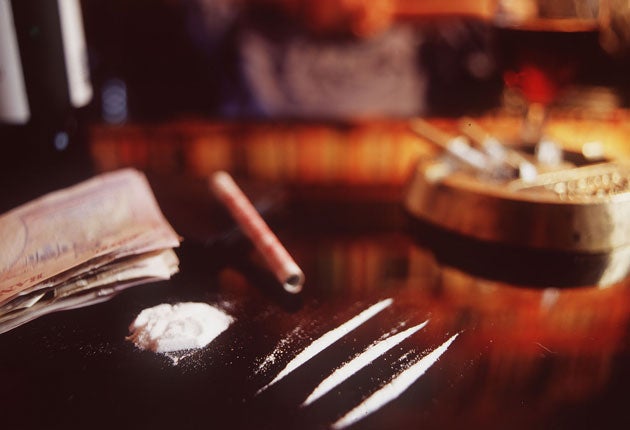Drug-control agency comes under fire as UK's cocaine use increases
Soca must do more to justify its £500m a year, say MPs as they call for scrutiny

Your support helps us to tell the story
From reproductive rights to climate change to Big Tech, The Independent is on the ground when the story is developing. Whether it's investigating the financials of Elon Musk's pro-Trump PAC or producing our latest documentary, 'The A Word', which shines a light on the American women fighting for reproductive rights, we know how important it is to parse out the facts from the messaging.
At such a critical moment in US history, we need reporters on the ground. Your donation allows us to keep sending journalists to speak to both sides of the story.
The Independent is trusted by Americans across the entire political spectrum. And unlike many other quality news outlets, we choose not to lock Americans out of our reporting and analysis with paywalls. We believe quality journalism should be available to everyone, paid for by those who can afford it.
Your support makes all the difference.Britain's most important drug-control organisation has come under fire over its lack of accountability and transparency.
MPs on the Home Affairs Committee called for a scrutiny body to oversee the Serious Organised Crime Agency (Soca), in a searing report on the Government's controversial answer to the FBI.
The committee heard warnings that the UK is "bucking the trend", with an increase in the illegal use and trade in cocaine, when other countries are reporting a decline. It concluded that the agency needed to do more to justify the £500m poured into its coffers every year.
"It may be time for Soca to have some measurable targets," said the committee's chairman, Keith Vaz, of the agency, which was condemned earlier this year over the revelation that only £1 was seized from organised crime gangs for every £15 in its budget. "We also need some mechanism for day-to-day accountability for Soca... it may be time to create a police authority to oversee its work."
The agency, which is also tasked with disrupting drug-smuggling operations, seized more than 85 tons of cocaine and 38 tons of cannabis last year. The committee is investigating its contribution to the fight against the cocaine trade. Gwyn Prosser, a committee member, raised concerns about the success of the enforcement policy during the compilation of the Soca report. He said: "The European Monitoring Centre ... confirmed the view of the committee that, whereas in the rest of Europe cocaine use and trading seems to be stabilising – and, in some places, declining – in the UK we are bucking that trend."
An agency spokeswoman said: "Soca's priority is stopping cocaine before it reaches the UK's borders."
A memo to the committee, obtained by The Independent on Sunday, reveals that the number of cocaine seizures – and the amount recovered – at the UK border fell last year.
Details of the state of Britain's fight against cocaine at its borders and beyond came as new statistics showed a rise in successful operations around the UK. Figures obtained by the IoS show that the number of police seizures producing "quantifiable" amounts of drugs rose from 1,487 in 2006-07 to 1,702 in the last financial year.
The Home Office statistics showed cannabis to be the drug most regularly seized in England and Wales, and the number of cannabis plants seized rose from 342,000 to 643,510 in three years. The number of cocaine seizures stayed high, although the recovered amounts decreased by a fifth. Discoveries of drugs including anabolic steroids, Rohypnol and magic mushrooms showed dramatic increases.
Overall, the statistics reveal the amount of cannabis seized by police and customs nearly doubled last year – increasing to 65 tons. But, for the third consecutive year, cocaine was the drug recovered most often.
A Home Office spokesman said the increase in seizures showed the Government's campaign against drugs was working. But David Raynes, head of the National Drugs Prevention Alliance and a former customs investigation officer, said the implementation of Soca had been "deeply flawed". He added: "Smuggling drugs into Britain is more risk-free than at any time in 30 years."
Join our commenting forum
Join thought-provoking conversations, follow other Independent readers and see their replies
Comments